Text
T - Verbs in Chinese
Tackle (an issue) - 处理 (chǔlǐ)
Take - 拿 (ná)
Talk - 说 (shuō)
Target - 瞄准 (miáozhǔn)
Teach - 教 (jiāo)
Tell - 告诉 (gàosù)
Terminate - 终止 (zhōngzhǐ)
Testify - 作证 (zuòzhèng)
Thank - 感谢 (gǎnxiè)
Think - 想 (xiǎng)
Threaten - 威胁 (wēixié)
Throw - 扔 (rēng)
Tie - 系 (jì)
Tighten - 紧 (jǐn)
Tolerate - 容忍 (róngrěn)
Touch - 触摸 (chùmō)
Train - 训练 (xùnliàn)
Transfer - 转移 (zhuǎnyí)
Transform - 转变 (zhuǎnbiàn)
Translate - 翻译 (fānyì)
Transmit - 传送 (chuánsòng)
Travel - 旅行 (lǚxíng)
Tremble - 颤抖 (chàndǒu)
Trigger - 触发 (chùfā)
Trust - 信任 (xìnrèn)
Try - 尝试 (chángshì)
Type - 打字 (dǎzì)
87 notes
·
View notes
Text
聊天的词 2
More words I learned from my language exchange friends!!
可怕 [ kě pà ] - scary, horrible
(很)酷 [ kù ] - cool (internet slang); literally: cruel, extremely
电视剧 [ diàn shì jù ] - tv series, drama
头像 [ tóu xiàng ] - avatar, profile picture
动漫 [ dòng màn ] - anime, cartoon
年轻人 [ nián qīng rén] - young people
表达 [ biǎo dá ] - expression (of speech)
困 [ kùn ] - sleepy
恶心 [ ě xīn ] - disgusting, feel like vomiting
(狠)毒 [ dú ] - vicious, poisonous
抱歉 [ bào qiàn ] - feel sorry
早日康复 [ zǎo rì kāng fù ] - get well soon
另一 / 另外(的) [ lìng yī / lìng wài ] - other, another
曾经 [ céng jīng ] - once, used to
大部分 [ dà bù fèn ] - majority, most of
优美 [ yōu měi ] - graceful, exquisite
风景 [ fēng jǐng ] - scenery, landscape
Sentence Examples
对很可怕,但是很酷。(Yes it's scary, but it's cool)
你知道这个?这是一个泰国的电视剧。(Do you know this one? It's a Thai drama)
英文里面,有没有“笑死“的表达?(In English, is there an expression for "laughing to death"?)
他看起来好困了。 (He looks sleepy)
他让我觉得恶心。 (He makes me feel sick/grossed out)
老板太狠毒。 (Boss is so/very vicious)
我很抱歉,希望你早日康复。(I feel sorry (for you), (I) hope you get well soon)
另一首歌 (Another song)
我的好朋友曾经在日本住了两年。 (My good friend (once) lived in Japan for 2 years)
我在假期,大部分时间都有空。 (I'm on holiday, most of the time I am free/have time)
好优美的风景!(Beautiful/exquisite scenery)
91 notes
·
View notes
Text
Vocabulario de gramática
名词(míng cí) - Sustantivo
代词(dài cí) - Pronombre
数词(shù cí) - Numeral
量词(liàng cí) - Clasificador
动词(dòng cí) - Verbo
助动词(zhù dòng cí) - Verbo auxiliar
形容词(xíng róng cí) - Adjetivo
副词(fù cí) - Adverbio
介词(jiè cí) - Preposición
连词(lián cí) - Conjunción
助词(zhù cí) - Partícula gramatical
拟声词(nǐ shēng cí) - Onomatopeya
叹词(tàn cí) - Interjección
前缀(qián zhuì) - Prefijo
后缀(hòu zhuì) - Sufijo
成语(chéng yǔ) - Refrán, frase hecha (4 caracteres)
熟语(shóu yǔ/shú yǔ) - Frase hecha
主语(zhǔ yǔ) - Sujeto
谓语(wèi yǔ) - Predicado
宾语(bīn yǔ) - Objeto
补语(bǔ yǔ) - Complemento
结果补语(jiéguǒ bǔyǔ) - Complemente resultativo (ej 做完)
趋向补语(qūxiàng bǔyǔ) - Complemento direccional (ej. 上来)
程度补语(chéngdù bǔyǔ) - Complemento de grado (ej. 你画得很好)
时间补语(shíjiānbǔyǔ) - Complemento de tiempo
处所补语(chǔsuǒ bǔyǔ) - Complemento de lugar
数量补语(shùliàng bǔyǔ) - Complemento de cantidad
可能补语(kě néng bǔ yǔ) - Complemento potencial (indica si acción es posible o no) Ej 看得清楚 吗?
状态补语 (zhuàngtài bǔyǔ)/情态补�� (qíngtài bǔyǔ) - Complemento de estado (describe un estado que se alcanza, se parece mucho al complemento de grado) Ej 她来得有点晚
定语从句(dìng yǔ cóng jù) - Oración atributiva
从属句(cóng shǔ jù) - Oración subordinada
层次句(céng cì jù) - Frases (subordinadas) a niveles (lit. frases a capas)
流水句(liú shuǐ jù) - Frases que fluyen (frases largas con muchas subordinadas) (lit. frases como agua fluyendo)
感叹句(gǎn tàn jù) - Frase exclamatoria
假设句(jiǎ shè jù) - Frase hipotética
转折句(Zhuǎnzhé jù) - Frase transicional
让步句(Ràngbùjù) Frase concesiva
反问句(fǎn wèn jù) - Pregunta retórica
反义词(fǎn yì cí) - Antónimo
同义词(tóng yì cí) - Sinónimo
简化字(jiǎn huà zì) - Caracteres simplificados
繁体字(fán tǐ zì) - Caracteres tradicionales
意味(yì wèi) - Significado
谐音(xié yīn) - Homófono
文字游戏(Wénzì yóuxì) - Juego de palabras
缩语(suō yǔ) Abreviación, acrónimo
意译(yìyì) - Traducción semántica (Ej 新年 como Año nuevo)
音译(yīn yì) - Transliterar, representar sonidos/caracteres de una lengua usando otra (Ej. traducir "Italia" como "yìdàlì" porque el sonido es similar)
口音(kǒu yīn) - Acento
声调(shēng diào) - Tono
1 note
·
View note
Text
I remember when I couldn't decipher anything they were saying on the radio and felt like Mandarin was like a secret code language. Like, I couldn't understand the syllables they were making at all. It was just gibberish to me
Now I can perfectly follow along, even with words I don't know, and I'm really happy about how far I've come

19 notes
·
View notes
Text
Chinese Verbs Cheat sheet: G's
A quick guide to some common G-verbs in Chinese!
Gain - 获得 - Huòdé Gather - 收集- Shōují Generate - 产生 - Chǎnshēng Get - 拿到 - Ná dào Get up - 起床 - Qǐchuáng Give - 给 - Gěi Give in - 让步 - Ràngbù Give up - 放弃 - Fàngqì Glare - 眩光 - Xuànguāng Glow - 发光 - Fāguāng Go - 去 - Qù Go back - 回去 - Huíqù Govern - 执政 - Zhízhèng Grab - 抓住 - Zhuā zhù Graduate - 毕业 - Bìyè Greet - 打招呼 - Dǎzhāohū Grieve - 悲伤 - Bēishāng Grow - 成长 - Chéngzhǎng Grumble - 发牢骚 - Fāláosāo Guard - 守护 - Shǒuhù Guess - 猜 - Cāi Guide - 指导 - Zhǐdǎo
107 notes
·
View notes
Text
Chinese Verbs Cheat sheet: E's
My quick guide to some common E- verbs in Chinese!
Eat - 吃 - chī Educate - 教育 - jiàoyù (this ones a bit formal) Empty - 清空 - qīngkōng Ensure - 确保 - quèbǎo Enter - 进入 - jìnrù Encourage - 鼓励 - gǔlì End - 结束 - jiéshù Enjoy - 享受 - xiǎngshòu Estimate - 估计 - gūjì Evaluate - 评价 - píngjià Examine - 检查 - jiǎnchá Excel - 出色 - chūsè Exceed - 超出 - chāochū Exchange - 交换 - jiāohuàn Exercise - 锻炼 - duànliàn Exist - 存在 - cúnzài Expect - 期望 - qīwàng Experience - 经历 - jīnglì Explain - 解释 - jiěshì Explore - 探索 - tànsuǒ
174 notes
·
View notes
Text

Hairstyle-related Vocabulary in Chinese 💇♂️ PS: Learn Chinese with the best FREE online resources, just click here https://www.chineseclass101.com/?src=tumblr_infographic_hairstyle_060624
6 notes
·
View notes
Photo





Textbooks have been ordered and delivered, study checklists have been made, workbook checklists have been made, and some notes have been taken.
All I need to do now is buy some new stationery / notebooks for school and I’ll be ready to go back to college on the 22nd!
Less than two weeks to go!
18 notes
·
View notes
Text
Mandarin LGBT Vocab
Note: All of these terms I learned from ShuoShuo Chinese~
Feel free to add on if you know more words!!
Gay & Lesbian
同性恋 / tóng xìng liàn - literally: "same sex/nature attraction", used for "gay/homosexual" or gay person; formal!
同志 / tóng zhì - literally: "comrade" but colloquially means "gay"
啦啦 / lā lā - lesbian (borrowed from English word)
弯 / wān - literally: "bent", colloquially means "gay" or "queer"
Note: Many Chinese will just say "gay", the English word.
Bisexual
双性恋 / shuāng xìng liàn - literally "both sex/nature attraction"
Transgender
变性人 / biàn xìng rén - literally: "change sex/nature person"
Straight
异性恋 / yì xìng liàn - literally: "different sex/nature attraction", formal!
直 / zhí - literally "straight"
Extra
出柜 / chū guì - literally: "come out of the cupboard/cabinet", which means coming out of the coset
人妖 / rén yāo - literally: "monster person", used for transgender people; NOTE THAT THIS IS AN OFFENSIVE TERM
If you'd like to see sentence examples, see below~
很多中国的老人不知道同性恋是什么。
hěnduō zhōngguó de lǎorén bù zhīdào tóngxìngliàn shì shénme.
Many Chinese older people don't know what homosexuality is.
我有很多同志朋友。
wǒ yǒu hěnduō tóngzhì péngyǒu.
I have many gay friends.
昨天我去了一家同志酒吧。
zuótiān wǒ qùle yījiā tóngzhì jiǔbā.
Yesterday I went to a gay bar.
这个明星是一个同志。
zhège míngxīng shì yīgè tóngzhì.
This celebrity is a gay.
很多中国���觉得拉拉一定是短头发,很像男孩子的女孩子。
hěnduō zhōngguó rén juédé lā lā yīdìng shì duǎn tóufǎ, hěn xiàng nán háizi de nǚ háizi.
Many Chinese people think that lesbians must be girls that have short hair and look like boys.
但是其实拉拉也可以是张头发,穿裙子,很温柔的女孩子。
dànshì qíshí lā lā yě kěyǐ shì zhāng tóufǎ, chuān qúnzi, hěn wēnróu de nǚ háizi.
But actually lesbians can also be a gender/soft girl with long hair and a skirt.
我是直的。她是弯的。他是一个gay。
wǒ shì zhí de. tā shì wān de. tā shì yīgè gèi.
I am straight. She is gay/queer. He is a gay.
他打算今天向父母出柜。
tā dǎsuàn jīntiān xiàng fùmǔ chū guì.
He plans to come out to his parents today.
她是一个变性人,她20岁的时候就做了变性手术。
tā shì yīgè biànxìng rén, tā 20 suì de shíhòu jiù zuòle biànxìng shǒushù
She is a transgender person, she had transgender surgery when she was 20 years old.
258 notes
·
View notes
Text
chinese art compliments/replies
as a follow up to my post on online drawing vocab, here is a collection of comments you can use to compliment others' art :-)
the basics
喜欢 [xǐhuān] - i like it
好好看 [hǎohǎo kàn] - looks good
厉害 [lìhài] - amazing
好漂亮/帥/美 [piàoliang/shuài/měi] - so pretty/handsome/beautiful
太有才了 [tài yǒu cáile] - so talented (similarily, 画画天才 => drawing genius)
好神 [hǎo shén] - godly
神迹 [shén jī] - miraculous
仙品 [xiān pǐn] - high-quality product
好鮮活 [xiān huó] - vivid/lifelike
it’s cute
可爱晕了 [kě'ài yūnle] - so cute i fainted
可爱死了 [kě'ài sǐle] - so cute I died
可爱鼠了 [kě'ài shǔle] - so cute I died (in a cutesy/meme way)
卡瓦 [kǎ wǎ] - kawaii
好米 [hǎo mǐ] - so cute/beautiful
太萌了 [tài méngle] - so adorable (originating from japanese word moe - 萌え, lots of different meanings, but mostly refers to happiness you feel when you see something really cute), can be used like 萌到我了/被萌晕/心被萌化了
basically any XX死了/XX暈了/XX炸了 comment works
expletives
我去 [wǒ qù] - damn
卧槽/我草/wc [wò cāo] - censored vers of 我操 => oh fuck
牛逼 [niú bī] - (fucking) awesome, usually just use 牛
exclamatives
哇/哇塞 [wasāi] - wow
啊啊啊啊 - aaaaaa
哇啊啊啊 - wahhhh
responding to compliments
被老師跨了,能力暴增 [kuà...bào zēng] - (if responding to commenter who's also an artist) compliments from teacher make my ability surge
爱您主人 - love u op (主人 refers to original commenter), can also just use 愛你
嘿嘿谢谢喜欢 - hehe ty for liking
比心 [bǐ xīn]- finger heart
送愛 [sòng ài] - sending love
亲亲 [qīn qīn] - kiss kiss
questions
可以当头像吗 [tóuxiàng] - can I make it my pfp
可以自印吗 [zì yìn] - can I print it out
可以收集吗 [shōují] - can I save it
求原图 [qiú yuán tú] - original image pls
这么时候接稿 [jiē gǎo]- when will you open commissions
misc.
抱走/拿走 [bào/ná zǒu] - carrying/taking it away
蹲蹲 [dūn dūn] - if someone has posted a WIP, waiting (for the finished piece/shop listing), direct trans. = squatting
982 notes
·
View notes
Text
Some Chinese fashion styles
Disclaimer: The following styles and their definitions were observed by me and are not authoritative. I am only familiar with Hanfu and if I made mistakes and picked the wrong photo examples or fraud shops, please let me know. Also, this post focused on women's fashion because 1. I am not into men's fashion so I don't know much about them. 2. The algorithm also knew that so I don't really see them.
汉服/Hànfú
传统服饰/Chuántǒng fúshì (传服/chuán fú)
清汉女/Qīng hàn nǚ
旗装/Qí zhuāng
旗袍/Qípáo
新国风/Xīn guó fēng、新��式/Xīn zhōngshì 汉元素/hàn yuánsù 茶艺服/Cháyì fú or 茶服/chá fú 唐装/Tángzhuāng 中山装/Zhōngshānzhuāng.
汉服/Hànfú
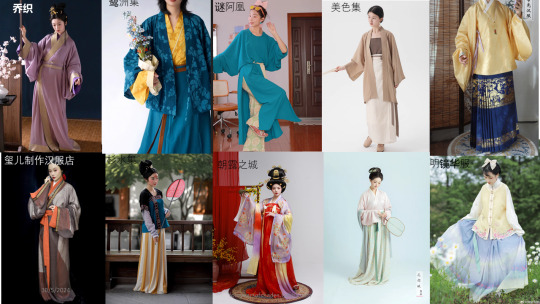
The ethnic clothing of Han Chinese (not the Han Dynasty).
There was a prohibition of Han clothing and hair styles in Qing dynasty, i.e. the 剃发易服/Tìfā yìfú qu Queue Ordinance, so modern hanfu is an on-going revivalist moment.
Modern hanfu are based on archeological evidences with minor twists to suit modern like, such as the type of fabric used and cut.
As a result, there are many types of garments and sub-styles. The figure above shows some examples.
While which style should be included and promoted is a constant debate, but in general, the cutout line is the Qing dynasty (however small accessories such as purses are alright).
传统服饰/Chuántǒng fúshì (传服/chuán fú)
No example because I am not sure who identified with this label.
The Chinese traditional clothing.
This either referred to historical clothing restorers (regardless of ethnicity) or people who promoted that the traditional clothing of Han people should be in the late Ming dynasty style, since "people should get up at where they had fallen".
They might be agreeable with the hanfu movement or not.
清汉女/Qīng hàn nǚ
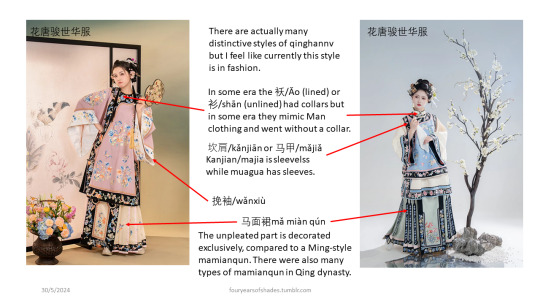
The clothing of women of Han Chinese in the Qing dynasty.
Since the Queue Ordinance wasn't that strictly enforced on Han women, the Han women clothing in the Qing dynasty had quickly absorbed Manchurian's elements while retaining the characteristic two-piece silhouette. (Manchurian women wore a one-piece robe.)
I believed it appeared around 2019 when the styles of hanfu had moved to fully embroidered surface to a more tone down brocade or weaved patterns.
旗装/Qí zhuāng
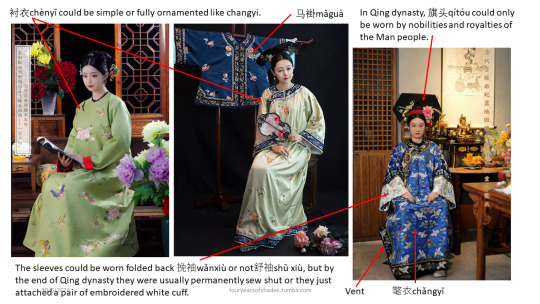
The ethnic clothing of Man people (Manchurian).
The women's clothing are generally in round collar opened on the left (youren) with straight sleeves.
The most basic item is a 衬衣/chènyī, which doesn't have vents.
However, the most common item I have seen on the street is a 氅衣/chǎng yī (probably rented), which should be worn on top of 衬衣, since they have side vents.
They usually have no standing-up collar but in some cases a fake collar could be worn.
On top of changyi they could wear a 马褂/mǎguà、坎肩/kǎnjiān、褂裥/guà jiǎn.
旗袍/Qípáo
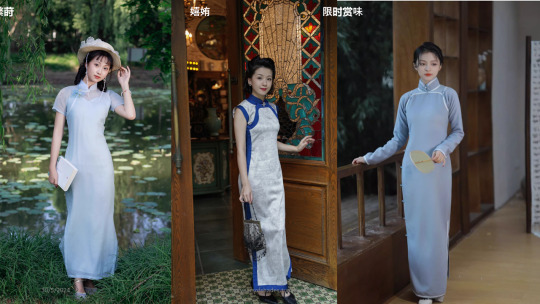
The Chinese clothing of women originated from the Minguo era, known in English as qipao or cheongsam.
The male equivalent is 长衫/chángshān.
Currently in style is the retro-cut, while uses the traditional flat cut (no shoulder seam) instead of the more body-hugging modern draping style.
There are also many variations and cuts, but the overall silhouette is similar.
新国风/Xīn guó fēng、新中式/xīn zhōngshì
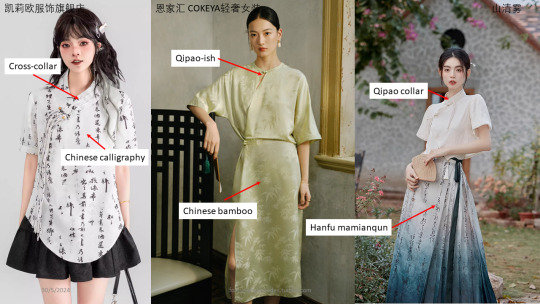
Innovative clothing that was inspired by Chinese traditional aesthetic.
It is an umbrella term.
汉元素/hàn yuánsù refers to clothing inspired by hanfu specifically, while xinguofeng could be inspired by qipao and other ethnic clothing. In addition, hanyuansu is a term more familair to hanfu-ers, so the target audience is slightly different between hanyuansu and xinguofeng.
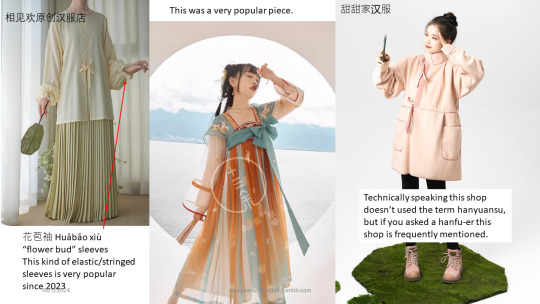
茶艺服/Cháyì fú or 茶服/chá fú,i.e tea dress, which aimed to convey a zen and rustic aesthetic could also be considered a sub-style. They are often worn by retirees, artists or workers in tea shops, calligraphy shops, Chinese spas, Chinese traditional medicine clinics etc.
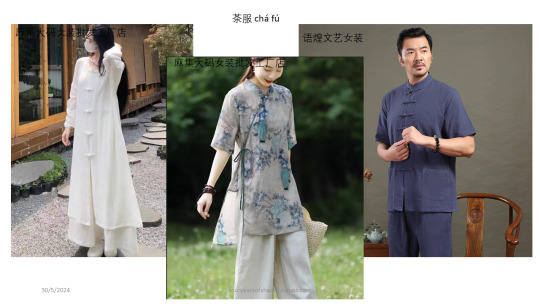
The older "Chinese style" generally refers to 唐装/Tángzhuāng and 中山装/Zhōngshānzhuāng.
Tangzhuang (Tang Suit) was a men suit characterized with a mandarin collar with a row of 盘扣/pán kòu frogs in the middle. There are two pockets at the bottom front of the suit. It was a well-known looked worldwide due to the 2001 APEC summit. However, other clothes resembled a 马褂/mǎguà could also be called a tangzhuang.
Zhongshanzhuang was designed and named after Sun Yat-sen but was often known in English as the Mao Suit. Mao Suit was characterised with a 关门领/Guānmén lǐng(“closed-door collar", but also known as Mao collar in English) with a row of round buttons. There are four pockets at the front of the suit.
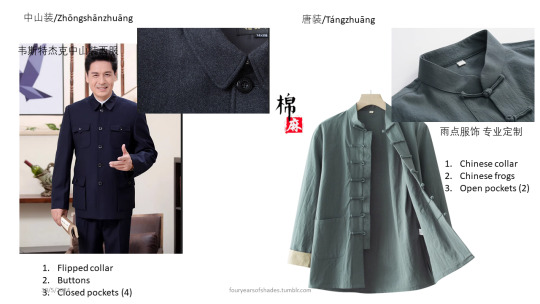
中华lolita/Zhōnghuá lolita
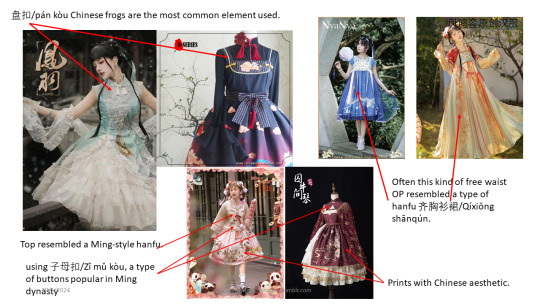
A sub-style of the lolita fashion inspired by cheongsam/qipao, hanfu or other Chinese artistic elements.
The same item could appeared in different styles, but with different cut and accessories. The following examples showed a mamianqun used in different styles.
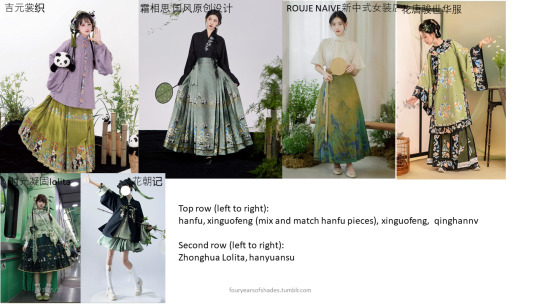
THE END
602 notes
·
View notes
Photo


Mandarin vocabulary sticker pack for personality descriptions. Available at Red Bubble
3 notes
·
View notes
Photo

An interesting story of what the Ancient Roman Empire 罗马帝国 (Luómǎ Dìguó) and Chinese Empire thought of each other @UCTS (http://io9.com/heres-what-third-century-china-thought-about-the-roman-1253007513#)
2 notes
·
View notes
Text
Learning Chinese with Lyrics #06 歌曲: 你啊你啊 (Only You) 歌手: 魏如萱 (waa wei)
So I've been doing songs from Taiwanese artists, but this is the first song that actually has Taiwanese in it! I'll highlight those parts with purple and include Taiwanese -> Mandarin -> English translations for the Taiwanese phrases. I also really really like this cover of it by 老王樂隊. I've been noticing that I can read the vocabulary that I've singled out in previous posts, which means exercise is working, yay 🎉 Thanks to Jocelle Koh for the English translation!
youtube
我最喜歡和你一起發生的 I like going through 是最平淡最簡單的日常 the most ordinary and simple days with you 面對面看著彼此咀嚼食物 Looking at each other chew food 是最平靜最安心的時光 is the most tranquil and soothing time
平淡 [píngdàn] - flat, ordinary, nothing special 咀嚼 [jǔjiáo] - to chew, to think over 平靜 [píngjìng] - tranquil, serene 時光 [shíguāng] - time, era
我不喜歡你和別人發生的 I don't like you having 是最曖昧最不明的隱藏 The most ambiguous and unclear secrets with others 面對面看著彼此假裝正常 Looking at each other pretending things are normal 是最可怕最噁心的事啊 is the most scary and disgusting thing
隱藏 [yǐncáng] - to hide, to conceal 假裝 [jiǎzhuāng] - to feign, to pretend
咁講你不知我愛的只有你 你啊你啊 kám-kóng lí m̄-tsai guá ài--ê tsí-ū lí niā-niā Don't say you don't know I only love you 哪會轉頭就要走 ná ē ua̍t-thâu tō beh tsáu And then turn your head to leave 一個兩個三個 tsi̍t-ê nn̄g-ê sann-ê One, two, three, 你愛的到底有幾個 lí ài--ê tàu-té ū kuí-ê Exactly how many do you love 麥擱講白賊話 mài koh kóng pe̍h-tsha̍t-uē Don't speak those sly words 我的心就要 痛甲一直流血 guá ê sim tiō beh thiànn kah it-ti̍t lâu-hueh My heart will hurt and continue to bleed
咁講 [kám-kóng] - aka 難道 (don't tell me) 麥擱 [mài koh] - aka 別再講了 (stop speaking) 白賊話 [pe̍h-tsha̍t-uē] - aka 講假話 (telling lies)
咁講你不知我愛的只有你 你啊你啊 kám-kóng lí m̄-tsai guá ài--ê tsí-ū lí niā-niā Don't say you don't know I only love you 哪會憨甲安捏啦 ná ē gōng kah án-ne--lah How could it be so 一天兩天三天 tsi̍t-kang nn̄g-kang sann-kang One day, two days, three days, 駕快你就愛著別人 tsiah kín lí tiō ài-tio̍h pa̍t-lâng Suddenly you love someone else 想欲甲你作伙 siūnn-beh kah lí tsò-hué Want to understand what you're thinking, 想欲你是我的 siūnn-beh lí sī guá-ê Want to make sure you're mine 攏是一場空 lóng-sī tsi̍t-tiûnn khang But it's just a illusion
攏是 [lóng-sī] - aka 全都是 (they are all...)
32 notes
·
View notes
Text
A Resource for Reading Practice: The Chinese Reading World
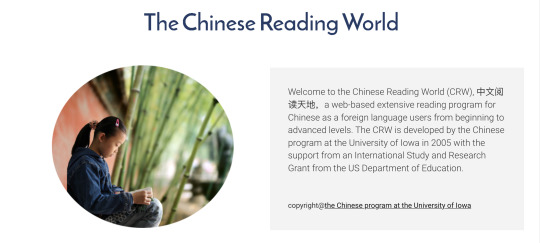
I wanted to share a resource for reading practice that I stumbled across recently. It’s called the Chinese Reading World, and it was a project led by the University of Iowa.
The site was put together from 2005 to 2008, so it’s not super up to date. However, there is a ton of content! Everything is sorted into 3 levels: beginning, intermediate, and advanced.
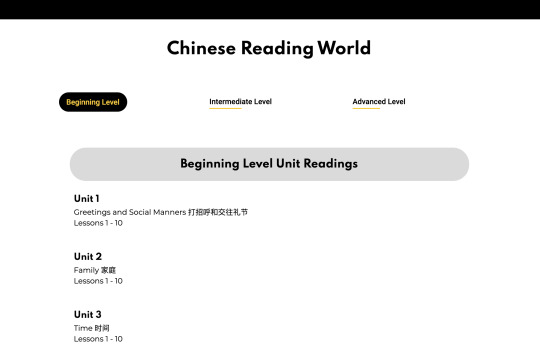
Each level has 30 units, and each unit has 10 lessons. The lessons begin with a vocab pre-test, then there is a reading with some comprehension questions. Lastly, there is a vocab post-test, which is the same as the initial test (at least for the lessons I’ve done so far). There’s audio for each lesson text, but unfortunately it can’t be streamed—you have to download it. There is also an achievement test at the end of each unit.
My experience has actually been that I already know all the words on the vocabulary tests, but the reading passages contain other words that I’m not familiar with.

So far, the readings I’ve encountered are not very long. This is nice since reading longer pieces can be frustrating at times. With shorter readings, you can just read 1 or 2 on some days and read more when you have more time/patience. I believe the readings are taken from Chinese newspapers.
Also, every unit has a theme. With 90 units total, there are bound to be themes that interest you. Example unit topics:
Directions and Asking Direction 方向和问路
Sports and Outdoor Activities 体育和户外运动
Chinese Music and Musicians 中国音乐和音乐家
Chinese Minorities and Local Customs 地方习俗和民族风情
Chinese Sports and Olympic Games 体育和奥林匹克
Contemporary Chinese Literature and Writers 中国当代文学和作家
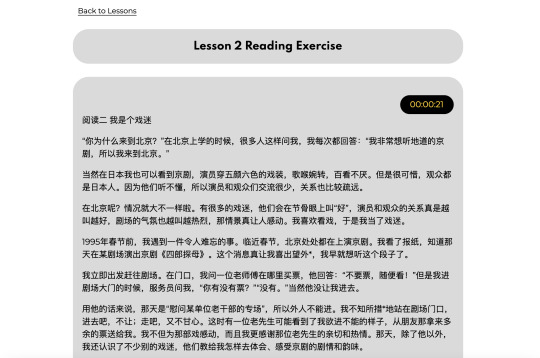
The 3 levels also each come with 5 proficiency tests. They seem to be based on vocabulary knowledge, so expanding your vocab is clearly a huge focus of this site. The only thing I’m unclear is about is I’m not sure exactly when the proficiency tests are meant to be taken. After completing all units? Or are they spaced out so you are supposed to take test 1 after the first few units, test 2 after the next few, etc.?

I’ve started working my way through the advanced section this week. With 300 advanced lessons alone, it really feels like I have an infinite number of articles to go through!
2K notes
·
View notes
Text
this just came on shuffle and like. turns out the type of artists i like is cringe as fuck live performers who wouldn't hesitate to go shooter for guys 10+ years their age
2 notes
·
View notes
